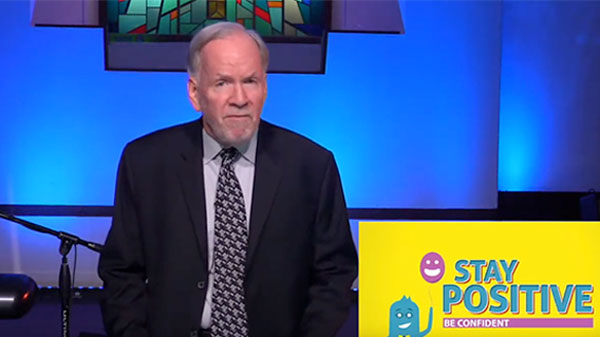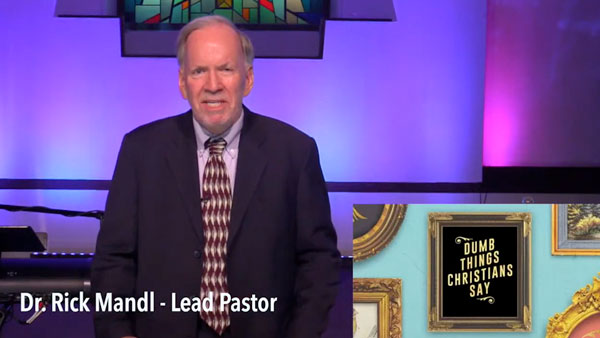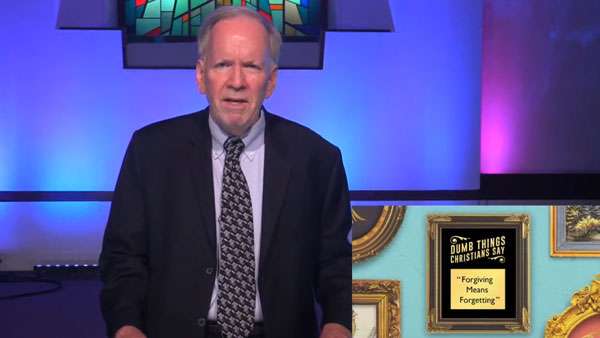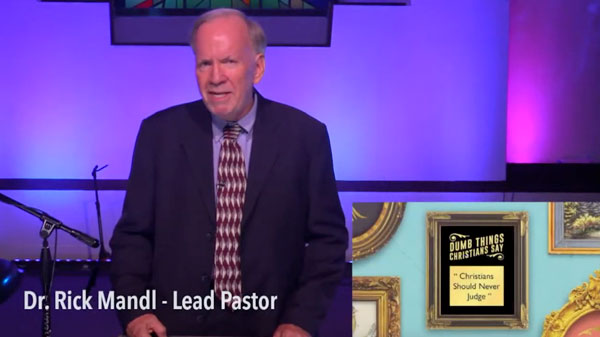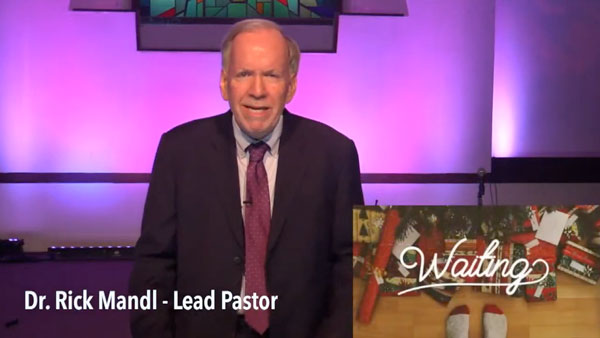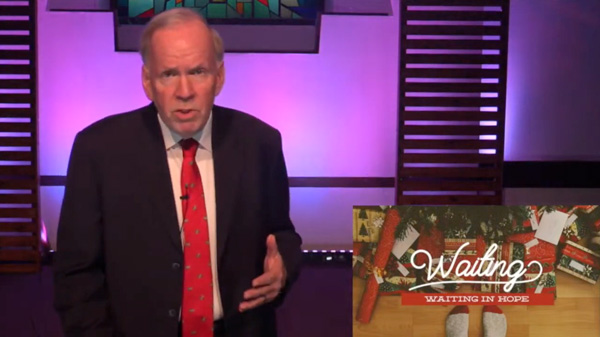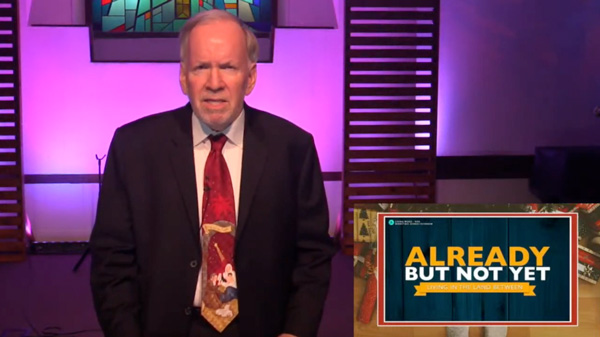Dr. Rick Mandl - October 17, 2020
Christians Should Never Judge
Sermon Manuscript: Dumb Things Christians Say Message 5- Christians Should Never Judge
Sermon preached by Dr. Rick Mandl, Eagle Rock Baptist Church, October 17 & 18, 2020
Recorded in Los Angeles, CA.
Great to welcome you wherever you are and however you may be watching. We're in a series called "DUMB THINGS CHRISTIANS SAY" looking at some of the most common... some of the most popular... SPIRITUAL URBAN LEGENDS. Things that sound like they come right from the Bible, but upon further examination you find out that there's more to the story. We've already looked at
- It Doesn’t Matter What You Believe As Long As You’re Sincere
- God Will Never Give You More Than You Can Handle
- Forgiving Means Forgetting
- Everything Happens For A Reason
Today we're looking at one of the MOST POPULAR Spiritual Urban Legends, it's the one that says that, "Christians Should Never Judge." And on that note... If you want to know the secret for getting your non-Christian friends... If you want to know the secret for getting anybody that you know who has never READ the Bible, to actually QUOTE the Bible... I'll tell you what the secret is. This is a secret that will work every single time. All you need to do, is make the following statement about something that someone DOES, or about something that someone BELIEVES. Just say these three words, and watch what happens. The three words are... "That's A Sin." Just say those three words and watch what happens. You'll be amazed. Now please understand... I'm telling you to say these words GRACIOUSLY… Please, please, please do not say them with a condemning harshness. Just make this statement, in reference to SOMETHING THAT SOMEBODY DOES...
Or when it comes to something that somebody BELIEVES, you can actually shorten it to just TWO WORDS. You can say, "That's Wrong." And I can almost guarantee that your friend... Your friend who may not know any other part of the Bible will quote to you Matthew chapter 7, and verse 1 Usually from the KJV which says what?? “Judge not, lest ye be judged."
People who have never been in a church. People who have never used a Bible for anything other than to hold down a coffee table, to keep it from floating away somehow they know this verse. They may not know where to find that verse in the Bible. They may not have any idea that they're quoting it out of context. But, if you dare to criticize anything that someone does, or anything that someone believes... If you dare to say "That is absolutely wrong” or “That is sin." Even if you say that graciously... You will be labeled... "A Bigot," or "Narrow Minded," or maybe the worst of all things that you can be called today, you will be labeled "INTOLERANT."
Now please don’t misunderstand me on this one... TOLERANCE is an important thing. It's a Biblical thing. The Bible teaches that Christians should be the most tolerant people. But unfortunately the meaning of the word TOLERANCE has changed through the years. TOLERANCE used to mean that you granted others the "right to be wrong." It was allowing others to live, and believe, in ways that you don't agree with, yet you still support their right to do that.
Today the meaning of the word has changed. Today when we use the word “tolerance” what we mean is that "everybody is right, nobody is wrong." You can never say anybody or anything is wrong. You can’t say that. And the reason you can’t say that is because there is no such thing as absolute right and wrong. For that reason you can never say anything is wrong. Whatever you believe, as long as you are sincere, or as long as you have a lobbyist group for it - - - no one can call it wrong. There are no absolutes, except for this one. The one absolute is... "Thou shalt not judge"
What does it mean to "judge"? That's an important question, because Jesus has some strong words to say about Matthew 7, in His Sermon on the Mount - arguably His best known teaching, Jesus said... “Do not judge, or you too will be judged. He said... For in the same way you judge others, you will be judged, and with the measure you use, it will be measured to you."
It would be awesome IF a deep dive into the original language in which the New Testament was written... I would be great, if really studying the GREEK helped you to understand exactly what is being said here. The problem is that the Greek word "Krino" which is translated Judge in this passage very much like our English word "judge" - - and what I mean by that is that it is somewhat ELASTIC. What I mean is, it can mean different things, depending on the context in which it's used. It can mean...
- To evaluate, choose or determine
When you think of the word “JUDGE” in that sense you realize that we judge things all the time. When you go shopping… When you buy a car… When you vote… When you decided who to date, and then who to marry… You were making a judgment, you were making a choice, you were making a determination.
Some people misunderstand Matthew 7, particularly verse 1 and they conclude that, that is what it means. "Christians should NEVER make any evaluations of any kind." They can NEVER call anything right or wrong because that would be making a judgment and Jesus said, "Judge not, lest ye be judged." They wrongly conclude that, a Christian can never make an evaluation of anyone else.
Now, IF that's what Matthew 7:1 means, we've got a problem. We have a problem in the Old Testament for example with Elijah the Prophet. Do you remember the story of Elijah on Mt. Carmel where he spoke out forcefully against King Ahab, the king of Israel and where he spoke against the false prophets of Baal.
We have a problem in the N.T. with the Apostle Paul who spoke against the Judaizers who had come into the church and were saying that you had to keep the Law of Moses in order to be saved. And, we have a huge problem with Jesus. Because JESUS himself TELLS US… In fact He COMMANDS US TO MAKE EVALUATIVE JUDGMENTS.
A little bit further down in Matthew 7… In that same passage where Jesus says "Judge not lest ye be judged" He also says in verse 6... "Do not give what is holy to the dogs, and do not throw your pearls before swine." It's important to understand that when he refers to “dogs” and “swine” he's not talking about a trip to the zoo, he's talking about people. He’s talking about people who are so far gone, that they won’t even listen to anything you try and say to them. And so, to take His words to heart you have to make some sort of evaluation to understand who is a dog and who is the swine as opposed to those who aren't.
Or skip down a few more verses down to Verse 15. There he says... “Watch out for false prophets. They come to you in sheep’s clothing, but inwardly they are ferocious wolves.” You can't watch out for them, you can't be on the lookout for them if you are not prepared to identify them by making some sort of evaluation.
Well if Jesus isn't prohibiting us from making evaluations, choices and determinations, then what does He mean when He says, "Don't judge"? The answer is - He is simply using another definition of that same Greek word Krino and this is the definition that means...
- To condemn or pass a final verdict,
This happens when you pretend to know the motive of a person when the reality is, you don't have all the facts. One of the ways it happens is when we make judgments based on appearances. I shared with some of you this week a daily devotional in which I asked you to imagine yourself in the following situation...
Imagine that you are out doing some shopping and you pull into a mall parking lot. Obviously this was back in the “Pre-Covid” days when we shopped in malls. But track with me here. The mall parking lot is crowded. You have a tough time finding a parking space. But finally you do, even though the only available parking spot seems like it’s miles from the store entrance. Still, you’re glad to have found a space, and you make the hike over to the store entrance. But just before you get to the store entrance you see someone pull into one of the parking spaces, marked HANDICAPPED PARKING ONLY. And that space of course is just a few steps from the store entrance.
Much to your surprise you see a lively, and pretty young lady who looks to be no more than 19 or 20 years old, jump out of the car and head into the store. She obviously is the picture of health. No wheelchair, No crutches. No cane. No limp. What would you do? Ignore it? Call the police? Confront her? Here’s what one person did. They left her a note. It read, “Shame on you. You are NOT handicapped. You have taken a space that could have been used by an actually handicapped person. You are a very selfish young lady.”
Of course, the story I’m sharing with you isn’t imaginary. It actually happened. And that young lady is Emelie Crecco. When she returned to the car after shopping she found the note and she said “I was LIVID.” Why? Because this 20-year-old young lady has Cystic Fibrosis.
Emelie shared her story on Facebook with these details. “CF affects the lungs (as one of many organs in the body) because of this I have a handicapped sticker. She said “I’m not one to ‘abuse’ the sticker, meaning I use it when I’m having a ‘bad day’ (some days it’s a little harder to breathe). Today was HOT so I needed to use my sticker. I was running errands all day around my town; I pulled into a handicapped spot and continued into the store.” When she returned she found the note.
Then Emelie says, “They clearly saw me walk out of my car, why not approach me? Not all handicaps are visible.” Then she adds, “I would love for you to share this story. It would help spread awareness for CF, (and) it would help open people’s minds to what handicapped really is.” I’m happy to share that story with you because Emelie’s story is an example of the problem that we as humans have of incorrectly judging someone’s appearance. Or motives.
We need to be careful of judging someone when you don't have all the facts. When Jesus tells us not to judge, he's not saying don't ever evaluate anything. What he's warning against is A CRITICAL AND CONDEMNING ATTITUDE, that should have no place in the lives of His followers. He's telling us that it's possible to judge something or someone, without being judgmental.
Let me say that again... It's possible to judge something or someone, without being judgmental. There's a WRONG WAY to judge and there's a RIGHT WAY to judge. If you want proof, you don't need to look any further than our memory verse for this week. It comes from John 7:24 and it's talking about a WRONG way to Judge and a RIGHT way.
John 7:24 says, “Do not judge according to appearance, but judge with righteous judgment” (John 7:24). Let me to encourage you to underline some words in that verse. First of all UNDERLINE the first three words... “Do not judge." And then just a few words over UNDERLINE the two words... “But judge..." This SAME VERSE that says we're NOT TO JUDGE IN ONE WAY, goes on to say WE ARE TO JUDGE IN ANOTHER. There's a wrong way, and a right way to judge.
Why do we have to be careful about... Judging Wrongly? Three reasons...
1. You're not the final judge, God is. God knows everything. God sees everything. God reserves the right to be God. Don't try to be him – because you’re not him.
Jesus then continues in Verse 2, and here's THE SECOND REASON, you need to be careful when it comes to judging, and that is that...
2. Judgment is a boomerang. Matthew 7:2, "For in the way you judge, you will be judged; and by your standard of measure, it will be measured to you." You've heard the old saying that "People who live in glass houses should not throw stones." Judgment has a way of boomeranging. It can create a gallows that you will hang on one day.
You remember the story in Esther Chapter 7 of Haman who built a gallows to hang righteous Mordecai, the Jew. Things turned around, and ultimately Haman was hung on the very gallows that he had made to hang Mordecai. Some of you remember that story from Esther 7, fewer of you may remember the next example.
There was a Canaanite king named Adoni-Bezek. We meet him in Judges Chapter 1. Now Adoni-Bezek was captured by the Israelites and they cut off his thumbs and his big toes, it's an odd passage. You wonder, "Why is that on the Bible?" What's the deal with the thumbs and the toes? The idea of cutting off someone's thumbs, is to take away the dexterity, the manipulative dexterity in the hands, you lose it, you lose the ability to fight, to wield a sword. Taking off the big toe, you lose balance.
In Judges 1:7 we read... Adoni-bezek said, “I once had seventy kings with their thumbs and big toes cut off, eating scraps from under my table. Now God has paid me back for what I did to them.” It’s the boomerang effect. This king had made a practice of doing this to other kings that he had conquered, and now it had happened to him. He judged by a measure, and he was judged with that measure.
The ancient Jewish rabbis used to say that God has two measures whenever he judges: The measure of JUSTICE and the measure of MERCY. Which measure would you like Him to use on you? If God is judging you, which measure do you want God to use? You want mercy, right? But... Which measure do you typically go to, when you judge other people? Mercy or justice? Usually justice. Someone passes you doing 90 in the freeway and you think "Never a cop around when you need him." But you know what... Another day You're running late. You're speeding. Somehow you’re not complaining that there's not a cop around then. Beware of judging wrongly because it can come back to bite you.
3. Third reason... It's Hypocritical. In Matthew 7:3 Jesus said, “Why do you look at the speck of sawdust in your brother’s eye and pay no attention to the plank in your own eye?” “How can you say to your brother, ‘Let me take the speck out of your eye,’ when all the time there is a plank in your own eye?” (Matthew 7:4). “You hypocrite, first take the plank out of your own eye, and then you will see clearly to remove the speck from your brother’s eye” (Matthew 7:5).
King David committed adultery. He took the only wife of Uriah the Hittite, a faithful soldier in David's army, and he had an adulterous affair with her. Her name was Bathsheba, you know the story. As a king, David was very wealthy. He had many wives. He could have taken almost anyone in his kingdom as his wife. But he took Uriah the Hittite's wife, committed adultery with her and so one day Nathan the Prophet paid him a visit. He said, "David, I've got a little problem I need your help on. There were two men living in the same town. One was the rich dude, one was a poor guy. The rich guy had many herds and many flocks. The poor man had nothing, just one single ewe lamb, a female lamb, a little lamb, that's all that he had, it was his pet. He cuddled with it every night on his chest. He fed scraps from the table. It was like a daughter to him, David. This rich guy had a friend coming from out of town and the rich guy said, "Well, I've got to make him a meal - How about rack of lamb." But instead of going to one of the sheep in the many flocks that he had, he stole the one small little pet from the poor man and killed it and they ate it for supper. David said, "That man shall surely die." Nathan the prophet said, "Really? David? Really? Because you are that man." You had many wives, God has blessed you with so much and yet, you stole the wife of Uriah the Hittite… And what you said about that man that he should die for what he did. That's the thing that you have done... .
Now, here's what's interesting, why did David say, "Kill him?" That wasn't the law. The Law of Moses didn't say, "Kill him." The Law of Moses said, "If somebody steals somebody's sheep, you've got to restore it fourfold, Pay them back four times." But because David was so familiar with the sin of the man in the parable, because it was his own sin, he came down on it hard. It was hypocritical and it was wrong! Be careful of Judging wrongly.
How do you judge Rightly? Three things to keep in mind...
- Judge Carefully.
In Matthew 7 Jesus isn't telling us not to make judgments. That's the DUMB thing we believe. What he's actually telling us is to be very, very careful about how you judge. He’s instructing us as to how to make judgments in the right way. We all make judgment calls. What we have to do, is make sure our judgments are wise. Jesus says the standard we use in judging is the same standard that will be applied to us.
How can you be careful when you judge? One thing to remember...
- Don't judge someone else if you're struggling with the same sin
We tend to be the most critical of on others, on the very things we dislike in ourselves. Now does this mean that because you're struggling in an area, you can't agree that that area is wrong? No, it just means take care of your own stuff first.
2. Judge Biblically
The myth that God doesn’t want us to judge, actually puts us in the awkward position of disagreeing with God, when He calls something sin, and we’re unwilling to do so. People love to say, "You shouldn't judge... Jesus didn't judge." And sometimes they'll point you to the story of the woman who was caught in adultery.
Do you remember that story? It's in John chapter 8. These men brought this woman who had been caught in adultery to Jesus, and they reminded him that the Old Testament Law said an adulterer should be stoned to death, and they asked him what should be done with her. Their motives in bringing this woman before Jesus weren’t right. It was a trick to see whether he would uphold the Law of Moses or not. Jesus’ response was interesting. He said go ahead and stone her... But the first stone needs to be thrown by the person who has no sin. After that, all of you can join in. Jesus knew what the result would be. He knew that there was no one without sin, so there was no one to throw the first stone. And do you remember what happened? All the woman's accusers left. Each and every one. Finally Jesus asked her, “Where are your accusers? Didn’t even one of them condemn you?” “No, Lord,” she said. Do you remember what Jesus said? And Jesus said, “Neither do I.
But the story doesn't end there He told her... Go and sin no more.” Jesus didn't CONDEMN her, but he did call what she was doing, "SIN." He didn't say, "Personally, I think this is sin, but who am I to judge." He didn't say, "If your lifestyle works for you - that's all that matters." He called sin, sin. If we're his followers, we'll do the same thing, but we’ll do it like he did it, we'll do it in a gentle, in a non-condemning way. When Jesus calls something sin, and we refuse to call it sin, we put ourselves at odds with Jesus. When we refuse to call sin, sin, we're not following Jesus we're disagreeing with Him.
There’s another area in which Christians often make mistakes when it comes to judging, and that is judging others over things on which God hasn't spoken. Some of the harshest criticisms I’ve heard about people have come in areas where the Bible doesn’t really speak. There are many areas where the Bible gives us general principles without spelling out all of the specific applications. Those general principles can leave us with some freedom and latitude in our behavior. However, it leaves us some areas for potential disagreement. We put ourselves in dangerous company when we judge others in an area where God has not spoken definitively. We become like the Pharisees who pontificated over things God really didn’t care about while missing out on the things He cares most about. Anything left out of the Bible was left out for a reason. Yet what we'll do is we'll say, "I know this isn't in the Bible, but it ought to be."
Let me give you one more under this heading – of judging Biblically... DON'T JUDGE NON-CHRISTIANS BY CHRISTIAN STANDARDS or DON'T EXPECT SOMEONE TO ACT LIKE A CHRISTIAN UNTIL THEY ARE ONE. The Bible says it’s not our business to judge unbelievers by our standards. They don’t profess faith in God. They haven’t made a commitment to follow Jesus. Why then do we criticize them when they don’t abide by our standards? Judge Carefully, Judge Biblically, and then finally... Judge Humbly - - -with grace.
Next to this one you might want to write these words... "Hate the sin, love the sinner." You may look at that and wonder... Yeah, but how? How it’s possible to hate one, without hating the other. They seem tied together, don’t they? "I don't know how to do it." Yes you do. In fact, you do it everyday. Do you know what I'm talking about? You do it every day when it comes to you. Somehow we've figured out a way of hating our own sins but still loving ourselves. This concept of self-love is so natural and deeply ingrained that Jesus used it as the basis for how we are to love others. “Love your neighbor as yourself.” That includes our enemies and those who are advancing a sinful agenda.
When it comes to judging them or anyone, God wants us to judge in the same way we both judge and love ourselves – boldly calling sin, sin, while responding with an abundance of grace and mercy. Judge carefully, Judge Biblically, Judge Humbly... The Dumb thing.... Christians shouldn't judge. ... The Smart thing – we should judge... But we need to judge Carefully, Biblically, Humbly. Would you pray with me….
Recorded in Los Angeles, CA.
Scripture References: Matthew 7:1-6, John 7:24
From Series: "Dumb Things Christians Say"
People have a lot to say, these days. On social media and among friends and family, we share opinions and advice freely. But sometimes Christians toss around statements that aren't exactly helpful or even biblically true. In this six-week series we’ll look at some of those spiritual urban legends and contrast them with what God’s Word actually says.



